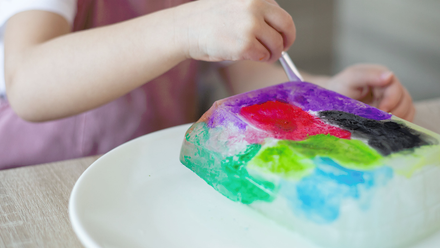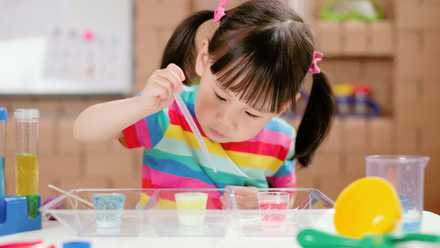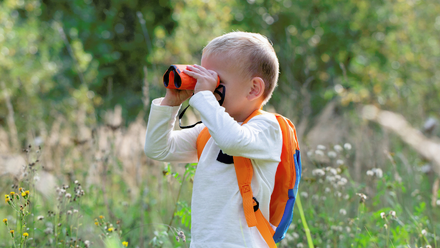Digital playgrounds: technology in early education and care
Listen to this article on the go.
It cannot be denied that children who are now in early education and care are growing up in a technological age. Digital technology is everywhere around us – from healthcare to domestic duties and everything in between, we use technology now more than ever. In fact, over 65% of children aged 3-4 reportedly use tablet devices, whilst 43% use a mobile/smartphone.
The use of digital technology in early education and care is widely debated for a variety of reasons, including safety, impact on wellbeing and social skill development. But this article offers a different outlook for using digital technology for learning to offer some frameworks, reasoning and advice for how to purposefully use technology in your setting.
What is digital technology?
Digital technology can refer to a wide range of devices and resources but, when thinking about their role in early education and care, digital technology can widely be considered as including:
- devices that have internet access, including smart home devices and entertainment packages
- screen-based devices, such as tablets, mobiles, and laptops
- toys and games with an electronic and digital aspect, such as musical toys and electronic learning toys
- everyday technologies commonly found round the home used in routine daily life.
Digital child refer to digital technology as:
“Devices such as personal computers and tablets, tools such as cameras, calculators and digital toys, systems such as software and apps, augmented and virtual reality, and less tangible forms of technology such as the Internet.”
We use technology in all areas of life, these days. Washing our clothes, using lights in the evening, driving home in the car or taking a bus – the list goes on well beyond our immediate ideas of technology, such as sending a text or watching a film. This is important for thinking about children’s experiences of the digital world – they are immersed in technology from the day they are born and it’s an unavoidable aspect of life.
As early education and care professionals, it’s becoming increasingly important to acknowledge the role that digital technology plays in our society and provide an effective role model for using it in healthy ways.
How can we use digital technologies purposefully?
Promoting communication
Whilst technology should never be used as a replacement for quality interactions, digital methods provide an exciting platform for engaging children in early literacy and communication. By using audio and visual platforms, digital technology can support a wide range of communication skills, through reading, writing and listening too.
- Use technology to enhance your current provision by using an audiobook to bring the story to life. Whether it’s playing the whole narrative or soundscapes that reflect the setting for a story, introducing a new musical perspective can promote imaginative skills to explore literacy through play.
Encouraging creative thinking
Making technology accessible in the playroom is something to be managed but, when approached well, can have wonderful benefits for everyone’s experiences of play! Think about technology as an aspect of the environment, much like you might add water to sand to change the dynamics of the play. It can be tempting, when using digital technology, to draw full focus to the time spent on the screen. Though many educational apps have their value on early learning, try to think about ways that the technology can be used to enhance non-digital play.
- Use a video like this one to bring to life the cosy cottage roleplay area.
- Investigate the plants in the garden using a plant-identifying app.
- Imitation technological items have their value, but it can be even more exciting to use the real thing where possible. Microwaves often ‘ping’ still without a power supply so why not implement one in the mud kitchen for an authentic feel?
A new sensory experience
When thinking about digital worlds, we often associate it with what we can see and what we can hear but, by sparking children’s imaginations, digital technology can be used to enhance wider sensory experiences too.
- Adaptations such as sensory lights and projectors can transform a room into a starry night sky or light up the world for an end-of-the-day disco.
- Electric diffusers omit a variety of scents into the room to promote a new range of sensory experiences. Why not use a lemon flavour in the kitchen roleplay to make a beautiful lemonade for the picnic, or a floral scent in the springtime when planting new seeds for the garden?
Key takeaways
The use of digital technologies divides opinions in the early years, with some parents, carers and professionals having concerns for online safety, and general wellbeing such as sleep hygiene. However, others argue that digital technology is an inevitable aspect of modern life and our role as early education and care professionals involves equipping children with the necessary skills to navigate it respectfully and safely. Technology can be used in a variety of ways to enhance current learning and should be considered as a factor in play to be utilised through imaginative thinking, rather than the centre of play itself. So, whilst it’s not time to say goodbye to screens entirely, it might be time to reinvent the ‘computer corner’ and integrate technology into traditional learning opportunities.
Why not check out NDNA’s free online course for online safety in early years?






